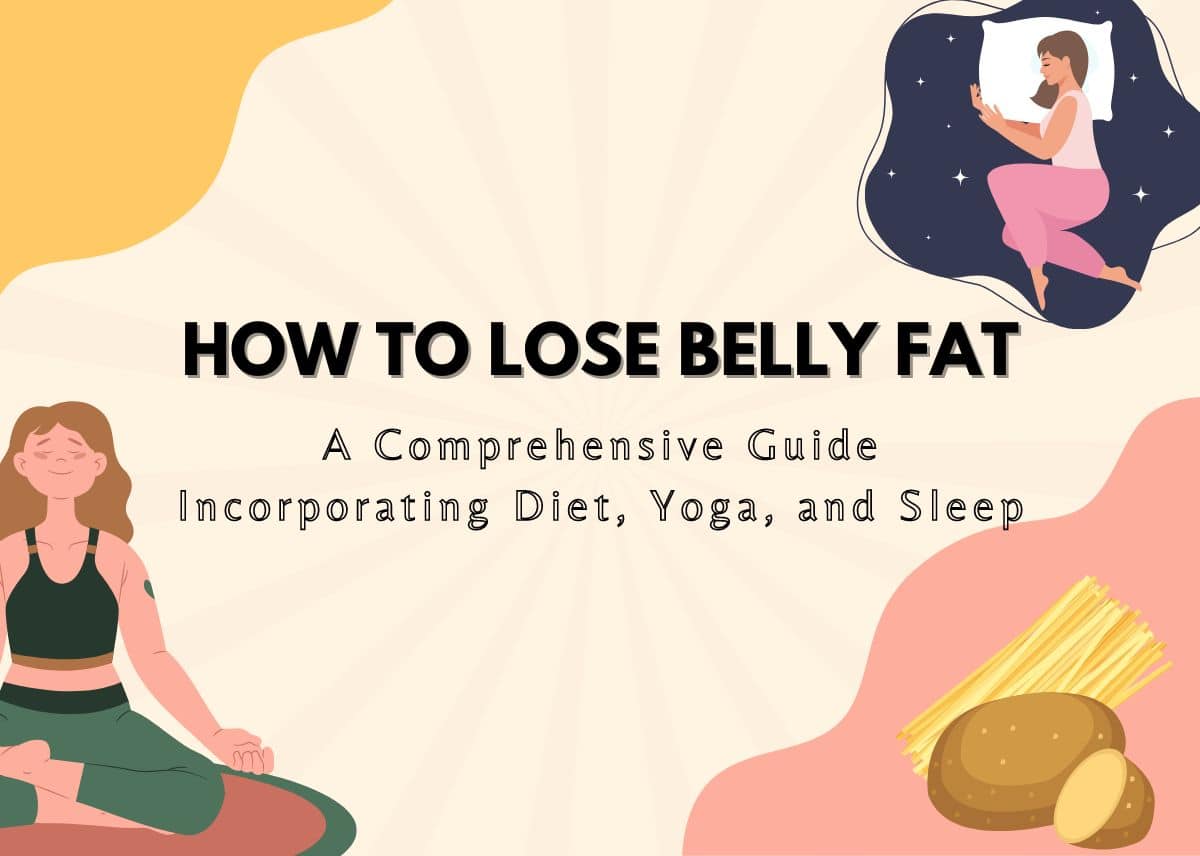How to Lose Belly Fat? In today’s fast-paced world, battling belly fat has become a common goal for many individuals. Not only does excess belly fat affect our appearance, but it’s also associated with various health risks.
Fortunately, adopting a holistic approach that combines the right diet, yoga practices, and adequate sleep can lead to effective and sustainable belly fat loss. This article will provide you with valuable insights and actionable steps to achieve your goal.
Table of Contents
How to Lose Belly Fat? Understanding the Challenge
1. The Impact of Belly Fat on Health
Excess belly fat is not just a cosmetic concern; it’s a health issue. Research links abdominal fat to a higher risk of cardiovascular diseases, type 2 diabetes, and other metabolic disorders. The fat around your abdomen, known as visceral fat, releases hormones and chemicals that can negatively affect your organs’ functioning.
2. Factors Contributing to Belly Fat Accumulation
Multiple factors contribute to the accumulation of belly fat, including genetics, sedentary lifestyle, unhealthy eating habits, stress, and hormonal imbalances. Addressing these factors holistically is crucial for effective and sustainable belly fat loss.
The Role of Diet in Belly Fat Loss
1. Choosing the Right Foods for Weight Management
A balanced diet rich in whole foods, lean proteins, fruits, vegetables, and healthy fats is essential for managing belly fat. Avoid or limit processed foods, sugary snacks, and excessive consumption of refined carbohydrates.
2. Incorporating Fiber and Protein-Rich Foods
Fiber-rich foods keep you feeling full and help regulate digestion. Include whole grains, legumes, nuts, and seeds in your meals. Protein is also vital for preserving muscle mass during weight loss; opt for lean protein sources such as chicken, fish, tofu, and beans.
3. Importance of Portion Control
Even healthy foods can contribute to weight gain if consumed excessively. Practice portion control to avoid overeating. Listen to your body’s hunger and fullness cues to prevent unnecessary calorie intake.
4. Hydration and Its Effect on Metabolism
Drinking enough water boosts your metabolism and supports overall bodily functions. Replace sugary beverages with water, herbal teas, and infused water for a calorie-free hydration option.
Yoga for Belly Fat Reduction
1. Introduction to Yoga as a Physical and Mental Practice
Yoga offers a holistic approach to health, targeting both the body and mind. It promotes mindfulness, reduces stress, and enhances body awareness, making it an effective tool for managing belly fat.
2. Yoga Poses Targeting Abdominal Muscles
Certain yoga poses directly engage the abdominal muscles, helping to tone and strengthen the core. Poses like Boat Pose (Navasana), Plank Pose, and Bridge Pose activate the core muscles and aid in belly fat reduction.
3. Stress Reduction and Its Impact on Weight Loss
Chronic stress triggers the release of cortisol, a hormone associated with weight gain, particularly in the abdominal area. Practicing yoga’s relaxation techniques can lower stress levels, potentially aiding in belly fat loss.
4. Building Core Strength through Regular Yoga Practice
Consistent yoga practice gradually builds core strength and stability. As your core becomes stronger, you’ll notice improved posture, reduced back pain, and a tighter midsection.
Unlocking the Power of Sleep
1. Understanding the Link Between Sleep and Weight Management
Sleep plays a vital role in weight regulation. Poor sleep disrupts hormones responsible for appetite and satiety, often leading to overeating and weight gain, especially around the belly area.
2. Establishing a Consistent Sleep Schedule
Aim for 7-9 hours of quality sleep each night. Set a regular sleep schedule by going to bed and waking up at the same time, even on weekends. Consistency supports your body’s internal clock and enhances sleep quality.
3. Creating an Ideal Sleep Environment
Make your bedroom conducive to sleep by keeping it dark, quiet, and cool. Invest in a comfortable mattress and pillows to ensure a restful night’s sleep.
4. Avoiding Sleep Disruptors for Optimal Hormonal Balance
Limit caffeine and heavy meals close to bedtime, as they can interfere with sleep. Additionally, reduce screen time before sleep and practice relaxation techniques like deep breathing or meditation to prepare your body for rest.
Creating Your Comprehensive Belly Fat Loss Plan
1. Integrating Diet, Yoga, and Sleep for Maximum Results
Combining a balanced diet, regular yoga practice, and sufficient sleep forms a potent strategy for belly fat loss. These components complement each other, enhancing metabolism, reducing stress, and promoting overall well-being.
2. Setting Realistic Goals and Tracking Progress
Set achievable goals and track your progress to stay motivated. Celebrate small victories along the way and adjust your plan as needed.
3. Staying Consistent and Adapting to Challenges
Consistency is key to success. While challenges may arise, view them as opportunities for growth. Make adjustments to your routine as circumstances change.
4. Celebrating Milestones and Maintaining Long-term Results
As you achieve your belly fat loss goals, celebrate your accomplishments. Maintain your healthy lifestyle by continuing to prioritize a balanced diet, yoga, and quality sleep.
Conclusion
Losing belly fat requires a holistic approach that encompasses dietary choices, yoga practices, and sleep habits. By making informed decisions, practicing mindfulness, and nurturing your body, you can achieve not only a slimmer waistline but also improved overall health and vitality.
FAQs
Can I target belly fat with specific exercises?
While spot reduction isn’t effective, exercises like yoga can help tone abdominal muscles and contribute to fat loss.
How soon will I see results?
Results vary, but with consistent effort, you can start noticing positive changes in a few weeks.
Is a specific diet like keto or vegan recommended?
The best diet is one that’s balanced and sustainable, tailored to your preferences and nutritional needs.
Can lack of sleep really contribute to belly fat?
Yes, inadequate sleep disrupts hormonal balance, which can lead to weight gain, especially around the belly.
Is yoga suitable for all fitness levels?
Yes, yoga offers modifications for various levels, making it accessible to beginners and experienced practitioners alike.
Also Read:








Exceptionally detailed
Glad you liked it 🙂